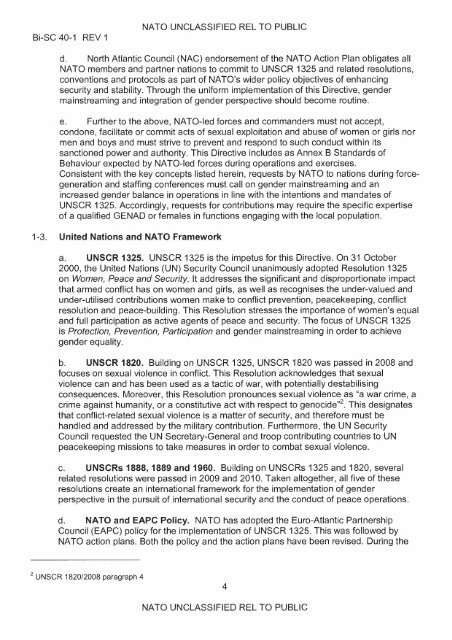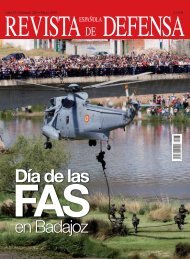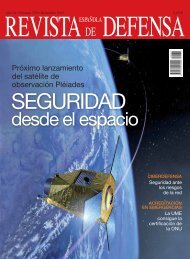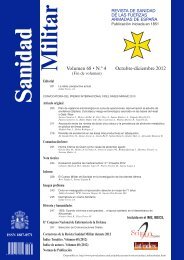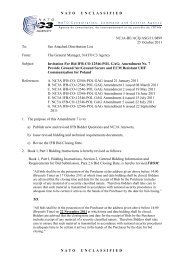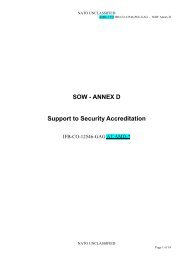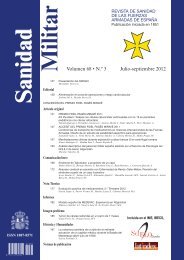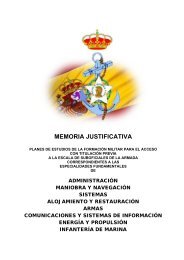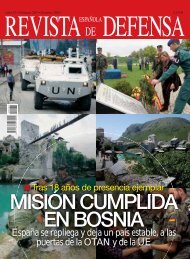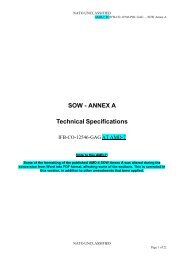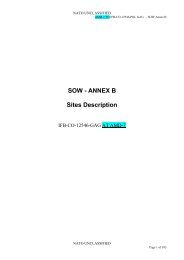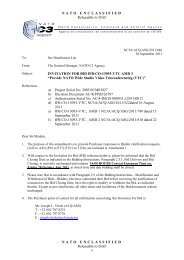~Ht;;:_~ME ALLIEDCOMMANDERS,ÃRO~b ... - Nato
~Ht;;:_~ME ALLIEDCOMMANDERS,ÃRO~b ... - Nato
~Ht;;:_~ME ALLIEDCOMMANDERS,ÃRO~b ... - Nato
Create successful ePaper yourself
Turn your PDF publications into a flip-book with our unique Google optimized e-Paper software.
Bi-SC 40-1 REV 1<br />
NATO UNCLASSIFIED<br />
REL TO PUBLIC<br />
d. North Atlantic Council (NAC) endorsement of the NATO Action Plan obligates all<br />
NATO members and partner nations to commit to UNSCR 1325 and related resolutions,<br />
conventions and protocols as part of NATO's wider policy objectives of enhancing<br />
security and stability. Through the uniform implementation of this Directive, gender<br />
mainstreaming and integration of gender perspective should become routine.<br />
e. Further to the above, NATO-led forces and commanders must not accept,<br />
condone, facilitate or commit acts of sexual exploitation and abuse of women or girls nor<br />
men and boys and must strive to prevent and respond to such conduct within its<br />
sanctioned power and authority. This Directive includes as Annex B Standards of<br />
Behaviour expected by NATO-led forces during operations and exercises.<br />
Consistent with the key concepts listed herein, requests by NATO to nations during forcegeneration<br />
and staffing conferences must call on gender mainstreaming and an<br />
increased gender balance in operations in line with the intentions and mandates of<br />
UNSCR 1325. Accordingly, requests for contributions may require the specific expertise<br />
of a qualified GENAD or females in functions engaging with the local population.<br />
1-3. United Nations and NATO Framework<br />
a. UNSCR 1325. UNSCR 1325 is the impetus for this Directive. On 31 October<br />
2000, the United Nations (UN) Security Council unanimously adopted Resolution 1325<br />
on Women, Peace and Security. It addresses the significant and disproportionate impact<br />
that armed conflict has on women and girls, as well as recognises the under-valued and<br />
under-utilised contributions women make to conflict prevention, peacekeeping, conflict<br />
resolution and peace-building. This Resolution stresses the importance of women's equal<br />
and full participation as active agents of peace and security. The focus of UNSCR 1325<br />
is Protection, Prevention, Participation and gender mainstreaming in order to achieve<br />
gender equality.<br />
b. UNSCR 1820. Building on UNSCR 1325, UNSCR 1820 was passed in 2008 and<br />
focuses on sexual violence in conflict. This Resolution acknowledges that sexual<br />
violence can and has been used as a tactic of war, with potentially destabilising<br />
consequences. Moreover, this Resolution pronounces sexual violence as "a war crime, a<br />
crime against humanity, or a constitutive act with respect to qenocide'". This designates<br />
that conflict-related sexual violence is a matter of security, and therefore must be<br />
handled and addressed by the military contribution. Furthermore, the UN Security<br />
Council requested the UN Secretary-General and troop contributing countries to UN<br />
peacekeeping missions to take measures in order to combat sexual violence.<br />
c. UNSCRs 1888, 1889 and 1960. Building on UNSCRs 1325 and 1820, several<br />
related resolutions were passed in 2009 and 2010. Taken altogether, all five of these<br />
resolutions create an international framework for the implementation of gender<br />
perspective in the pursuit of international security and the conduct of peace operations.<br />
d. NATO and EAPC Policy. NATO has adopted the Euro-Atlantic Partnership<br />
Council (EAPC) policy for the implementation of UNSCR 1325. This was followed by<br />
NATO action plans. Both the policy and the action plans have been revised. During the<br />
2 UNseR 1820/2008 paragraph 4<br />
4<br />
NATO UNCLASSIFIED<br />
REL TO PUBLIC


